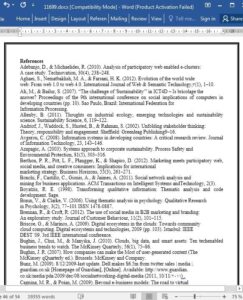Abstract
The digital transformation is an accumulation of various digital advancements, such as the transformation of the web phenomenon. The participatory web that allows for active user engagement and gather intelligence has been widely recognised as a value add tool by organisations of all shapes and sizes to improve business productivity and efficiency. However, its ability to facilitate sustainable business-to-business (B2B) activities has lacked focus in the business and management literature to date. This qualitative research is exploratory in nature and fills this gap through findings arising from interviews of managers and by developing taxonomies that highlight the capability of participatory web over passive web to enable different firms to engage in business operations. For this purpose, two important interrelated functions of business i.e. operations and marketing have been mapped against three dimensions of sustainability. Consequently, this research demonstrates the ability of big data and social media analytics within a participatory web environment to enable B2B organisations to become profitable and remain sustainable through strategic operations and marketing related business activities. The research findings will be useful for both academics and managers who are interested in understanding and further developing the business use of participatory web tools to achieve business sustainability. Hence, this may be considered as a distinct way of attaining sustainability.
1. Introduction
The term ‘Digital transformation’ has broad nuances and is attributed to driving various forms of technological innovation in both industrial and societal domains (Gray & Rumpe, 2017). Digital transformation generally refers to the globally accelerated process of technical adaptation by individuals, organisations, communities and nations resulting from digitalisation (Westerman, Bonnet, & McAfee, 2014). The focus of this study is the digital transformation of the web phenomenon, which has experienced a paradigm shift from a passive information source towards the collaborative and intelligent participatory web, which encourages active user engagement and contribution. The participatory web provides quick access to information and intelligence while also influencing the speed and frequency at which information travels thus presenting significant opportunities for managers to communicate and engage with stakeholders almost instantaneously. The enormous amounts of data generated and gathered from social networking sites (SNS) combined with the limited academic insights into big data and social media analytics, particularly from a business to business (B2B) context makes participatory web a highly relevant point of discussion.
9. Conclusions
This study highlights the relationship between two important but challenging domains of web-based technology (Participatory web) and sustainability in a B2B environment. Its exploratory nature supports the building of a theoretical foundation that can be used by other researchers for developing indicators of the relationship between these two domains; web-based systems and sustainability. This paper has sought to contribute to the literature by offering four novel classifications that underpin business sustainability. The developed taxonomies offer an insight into: (1) models associated with business sustainability; (2) ICT enablers for business sustainability; (3) models of business sustainability that leverage new technologies and Participatory web and, (4) the capabilities of Participatory web for business sustainability.










